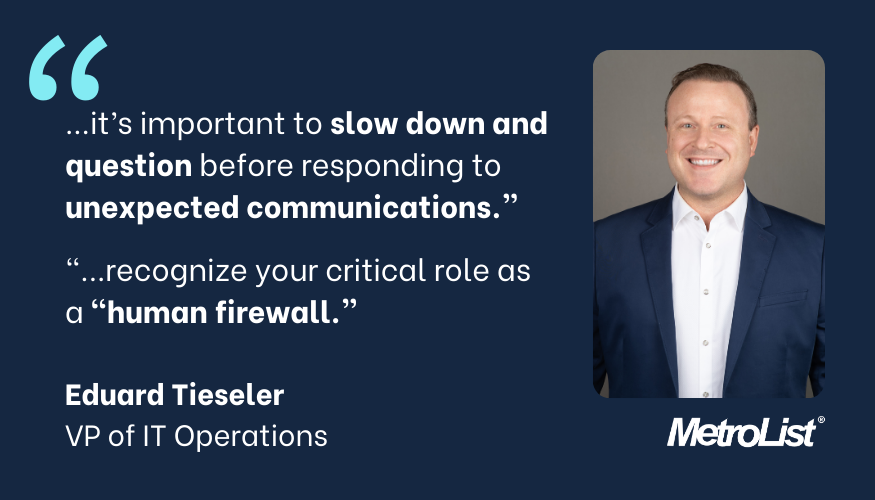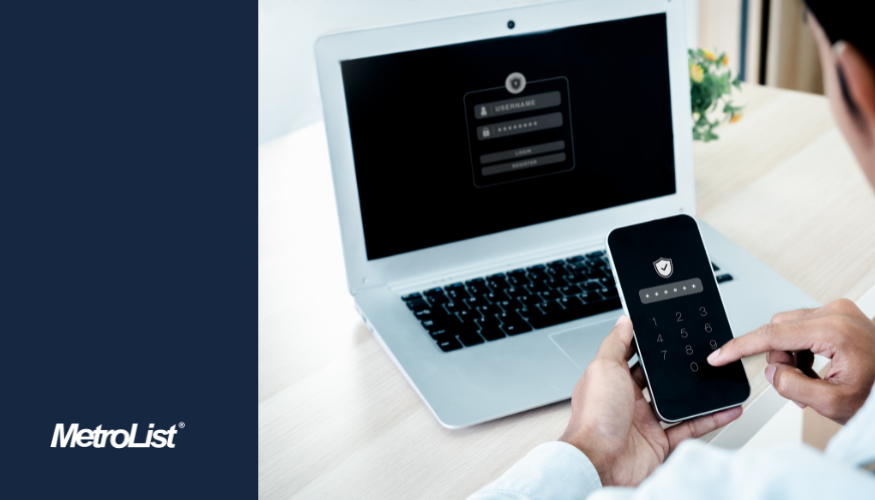MetroList: Safety Month, Cyber Threats
Written By Eduard Tieseler, VP of IT Operations and John Hughes, VP of Industry Relations
MetroList Promotes Cyber Safety
When people think about REALTOR® Safety Month, promoted by the National Association of REALTORS® (NAR), the first image that comes to mind is an agent showing a property, often alone with a stranger. But there is more to safety than watching your back. In today’s hyper-connected world, safety isn’t just physical. It is just as important to protect yourself online, where scams and cybercrime pose serious risks to your reputation, your client’s trust, and your business stability.
Cyber Threats Have Evolved
Cyber risks are among the most dangerous right now. A phishing email, a malicious text message, or even a fraudulent call can create stress, and in worst‑case scenarios, drain your finances. The consequences of a single misstep can result in lost clients, increased legal costs, damaged reputations, and compromised personal data. The prevalence of oversharing on social media not only helps target our physical movements, it has given electronic predators context upon which to highly personalize their virtual attacks.
How Electronic Attacks Show Up in Everyday Life
Today, so much of our professional and personal lives are dependent upon smartphones, laptops, and tablets. It only takes a single click on the wrong link to put you at risk. A cybercriminal may send you an urgent text pretending to be your broker, or a spoofed email from a bank asking you to “verify” your password. With the advent of AI, some “deepfake” attacks come to you in the form of a call that impersonates a familiar contact, even a family member.

These attacks are typically designed to create urgency, so your defenses drop, exposing you at the most vulnerable moments. That’s why it’s important to slow down and question before responding to unexpected communications. No matter if a communication arrives by phone, text, email, or through social media, treat each interaction as a potential threat and recognize your critical role as a “human firewall”.
Practical Steps You Can Take
The good news is that there are measurable ways to strengthen your defenses:
- Having an intentional online presence: Be careful of sharing your live location or physical routine. Do not post work or personal details on social media or enter them into public AI that could later be researched and referenced to obtain your trust.
- When it comes to your password: Length is key. Using a memorable phrase, like LucyGotCharlieAgain! creates a strong, highly secure password that’s both easy to recall and difficult to crack.
- Spotting phishing red flags: Always check sender addresses, hover over links before you click, be skeptical of urgent payment requests, and requests to call a provided phone number to cancel a pending payment.
- Reviewing your network security: Make sure your Wi‑Fi is protected with a strong password and updated encryption. Consider separating your work devices from your household network.
- Checking if your data is exposed: Use resources like Have I Been Pwned to see if your personal information was part of a data breach. If it was, change your passwords immediately and monitor your accounts.
- Protecting devices with multiple layers: Update your operating system, enable automatic backups, install antivirus software, and use multi-factor authentication (MFA) wherever it’s available. MFA is one of the most effective defenses against account takeovers.
- Training yourself to pause: When in doubt, don’t respond. Verify through another trusted channel.
Good for MetroList and Subscribers

At MetroList, we practice the same habits we encourage our subscribers to adopt, such as performing regular electronic backups, system updates to patch vulnerabilities, running antivirus protection, requiring multi-factor authentication for sensitive access, and even reviewing regular training to help spot malicious communications.
Think of these safeguards as the digital version of locking your doors. You wouldn’t leave your home unsecured; you shouldn’t leave your accounts, documents, and client information vulnerable online either.
Both Online and In‑Person Safety Matter
When we combine physical and online safety, we have a stronger, more resilient real estate community. Protecting yourself online means your clients can trust that their sensitive information is safe. Protecting yourself in the field means ensuring you can continue to serve your clients confidently and securely.
Both matter, and both are worth your attention during REALTOR® Safety Month and every day of the year.
